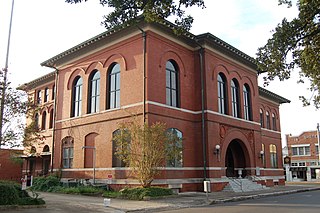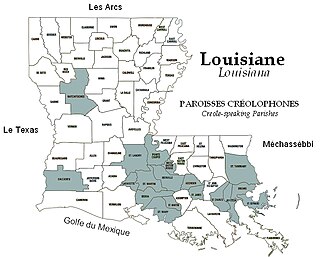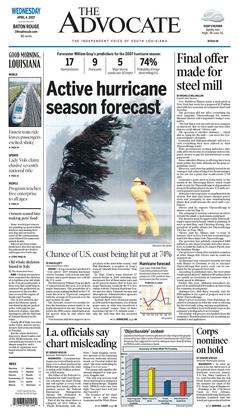Related Research Articles

Opelousas is a small city and the parish seat of St. Landry Parish, Louisiana, United States. Interstate 49 and U.S. Route 190 were constructed with a junction here. According to the 2020 census, Opelousas has a population of 15,786, a 6.53 percent decline since the 2010 census, which had recorded a population of 16,634. Opelousas is the principal city for the Opelousas-Eunice Micropolitan Statistical Area, which had an estimated population of 80,808 in 2020. Opelousas is also the fourth largest city in the Lafayette-Acadiana Combined Statistical Area, which has a population of 537,947.

Louisiana Creole is a French-based creole language spoken by fewer than 10,000 people, mostly in the US state of Louisiana. Also known as Kouri-Vini, it is spoken today by people who may racially identify as white, black, mixed, and Native American, as well as Cajun and Creole. It should not be confused with its sister language, Louisiana French, a dialect of the French language. Many Louisiana Creoles do not speak the Louisiana Creole language and may instead use French or English as their everyday languages.

William Spratling was an American-born silver designer and artist, best known for his influence on 20th century Mexican silver design.

Pelican Stadium, originally known as Heinemann Park (1915–1937), was a sports stadium in New Orleans, Louisiana from 1915 to 1957.

The Advocate is Louisiana's largest daily newspaper. Based in Baton Rouge, it serves the southern portion of the state. Separate editions for New Orleans, The Times-Picayune | The New Orleans Advocate, and for Acadiana, The Acadiana Advocate, are published. It also publishes gambit, about New Orleans food, culture, events, and news, and weekly entertainment magazines: Red in Baton Rouge and Lafayette, and Beaucoup in New Orleans.

Louisiana Creoles are a Louisiana French ethnic group descended from the inhabitants of colonial Louisiana before it became a part of the United States during the period of both French and Spanish rule. They share cultural ties such as the traditional use of the French, Spanish, and Creole languages and predominant practice of Catholicism.

The 1920 Louisiana gubernatorial election was held on April 20, 1920. Like most Southern states between the Reconstruction Era and the Civil Rights Movement, Louisiana's Republican Party had virtually no electoral support. This meant that the Democratic Party primary held on January 20 was the real contest over who would be governor. The election resulted in the election of John M. Parker as governor of Louisiana.

Henry Luse Fuqua Sr., was an American government official and politician. A Democrat, he is most notable for his service as the 38th Governor of Louisiana from 1924 until his death in 1926.
The Creoles of color are a historic ethnic group of Louisiana Creoles that developed in the former French and Spanish colonies of Louisiana, Mississippi, Alabama, and Northwestern Florida, in what is now the United States. French colonists in Louisiana first used the term "Creole" to refer to people born in the colony, rather than in Europe, thus drawing a distinction between Old-World Europeans and Africans from their descendants born in the New World. Today, many of these Creoles of color have assimilated into Black culture, while some chose to remain a separate yet inclusive subsection of the African American ethnic group.

Arnaud's is a restaurant in the French Quarter of New Orleans, Louisiana, specializing in Louisiana Creole cuisine. Established in 1918, it is one of the older and more famous restaurants in the city. The restaurant also houses a museum of the New Orleans Mardi Gras.
Lyle Saxon was a writer and journalist who reported for The Times-Picayune in New Orleans, Louisiana. He directed the Federal Writers' Project Works Progress Administration (WPA) guide to Louisiana.

Arcadia Publishing is an American publisher of neighborhood, local, and regional history of the United States in pictorial form. Arcadia Publishing also runs the History Press, which publishes text-driven books on American history and folklore.
Rouses Markets are a chain of grocery supermarkets in the U.S. states of Louisiana, Alabama and Mississippi with more than 6,500 employees.

Rolland Harve Golden was an American visual artist known mainly for his realism, abstract realism and "Borderline-Surrealisterm", a term he used to describe a style of his where the subject is "not entirely impossible, but highly unlikely." He is listed in Marquis Who's Who in America, Marquis Who's Who in American Art and Marquis Who's Who in the World.
The Prince of Wales and Other Famous Americans is a 1925 book by Miguel Covarrubias, a Mexican cartoonist. It is a collection of 66 black-and-white caricatures of famous American personalities from the 1920s. The future Edward VIII, alluded to in the title, appears as the frontispiece at a race track; he had made a widely publicized visit to the United States in 1924. Many of the drawings were originally published in Vanity Fair magazine, which employed Covarrubias as a staff cartoonist.

Paul Ėdouard Poincy was an artist in New Orleans, Louisiana, United States who specialized in portrait, religious, landscape, and genre painting.

The Boston Club is an exclusive private gentlemen's club in New Orleans, Louisiana, US, founded in 1841 as a place for its white members to congregate and partake in the fashionable card game of Boston. It is the third oldest City Club in the United States, after the Philadelphia Club (1834) and Union Club of the City of New York (1836).

The Pickwick Club is a private gentlemen's club in New Orleans, Louisiana. Founded in 1857, The Pickwick Club and the Mistick Krewe were originally one group comprising two organizations. After The Boston Club, The Pickwick Club is the second oldest remaining in the city.
Dixie Bohemia: A French Quarter Circle in the 1920s is a 2012 book by John Shelton Reed, published by Louisiana State University Press.
References
- ↑ "Contact Us". pelicanpub.com. Retrieved 2023-12-27.
Pelican Publishing 990 N. Corporate Dr., Suite 100 New Orleans, LA 70123
- The address states "New Orleans, LA" but the physical location is in the Elmwood CDP. The directions to a particular intersection refer to an earlier headquarters location in New Orleans proper, and does not reflect the latest update. - ↑ "In the age of distraction, one small publisher keeps local history alive in sepia tones". The Washington Post. ISSN 0190-8286 . Retrieved 2023-05-08.
- ↑ Herman, Jeff (2012). Herman's Guide to Book Publishers, Editors, & Literary Agents . Naperville, IL: Sourcebooks, Inc. p. 269. ISBN 9781402260612.
- ↑ "About Us". pelicanpub.com. Retrieved 9 May 2023.
- ↑ "Sherwood Anderson and Other Famous Creoles: A Gallery of Contemporary New Orleans, William Faulkner's New Orleans". Howard-Tilton Memorial Library. Tulane University. Retrieved 9 May 2023.
- ↑ Spratling, William; Faulkner, William (1 January 2022). Sherwood Anderson and Other Famous Creoles. Open Road Media. ISBN 978-1-5040-6815-4 . Retrieved 9 May 2023.
- ↑ Reed, John Shelton (17 September 2012). Dixie Bohemia: A French Quarter Circle in the 1920s. LSU Press. ISBN 978-0-8071-4766-5 . Retrieved 9 May 2023.
- ↑ "La. Publisher, Historian Dies". The Daily World. 2 Aug 1966. Retrieved 9 May 2023.
- ↑ "Charter of Pelican Book Shop, Incorporated". West Bank Herald. 27 Jan 1927. Retrieved 9 May 2023.
- ↑ "In Which We Sink Our Modesty and Talk About Ourselves..." Louisville Courier-Journal. 3 Feb 1930. Retrieved 9 May 2023.
- ↑ Landry, Stuart Omer (1945). The Cult Of Equality. Pelican Publishing.
- ↑ "A Nation At The Racial Crossroads; Indictment Of Champions Of Equality". The Montgomery Advertiser. 15 Apr 1945. Retrieved 9 May 2023.
- ↑ Facincani, Lee. ""The Liberty of the Nation is in Jeopardy": Views on the Battle of Liberty Place From Beyond Dixie". University of New Orleans. Retrieved 9 May 2023.
- ↑ Landry, Stuart Omer (1957). Rebuilding the Tower of Babel: A Study of Christianity and Segregation. Pelican Publishing. Retrieved 16 December 2021.
- ↑ Gardner, Dan (18 Oct 1945). "Plain Talk: Dark Races on the March". The California Eagle. Retrieved 9 May 2023.
- ↑ Phillips, Faye (2007). "Review of Louisiana Almanac, 2006-2007 Edition". Louisiana History: The Journal of the Louisiana Historical Association. 48 (4): 492–494. ISSN 0024-6816. JSTOR 25478516 . Retrieved 9 May 2023.
- 1 2 Adler, Constance (27 Feb 2001). "The House That Dr. Calhoun Built". Gambit. p. 2. Archived from the original on 30 June 2001. Retrieved 9 May 2023.
- ↑ "Carter Will Become Book Publisher". Biloxi Daily Herald. 1 Mar 1967. Retrieved 9 May 2023.
- ↑ "Hodding Carter Sells Pelican Publishing Co". The Concordia Sentinel. 22 Apr 1970. Retrieved 9 May 2023.
- ↑ "Publishing Firm Bought By Former City Residents". The Monroe News-Star. 23 Apr 1970. Retrieved 9 May 2023.
- ↑ "Vice-Presidential Discussion". North Baton Rouge Journal. 5 Nov 1970. Retrieved 9 May 2023.
- ↑ "Fire ravages publishing company in Jeff Parish". The Daily Advertiser. 3 Jan 1998. Retrieved 9 May 2023.
- ↑ Sebesta, Edward H. "Neo-Confederate publisher of books for African American children". H-Net. Retrieved 16 December 2021.
- ↑ "Pelican's Index 1999: W". Pelican Publishing Company. Archived from the original on 1999-10-11. Retrieved 2023-12-27.
- 1 2 Adler, Constance (27 Feb 2001). "The House That Dr. Calhoun Built". Gambit. p. 1. Archived from the original on 28 April 2001. Retrieved 9 May 2023.
- 1 2 Adler, Constance (27 Feb 2001). "The House That Dr. Calhoun Built". Gambit. p. 3. Archived from the original on 7 May 2001. Retrieved 9 May 2023.
- ↑ "Milburn Calhoun Obituary (2012) - New Orleans, LA - The Times-Picayune". Legacy.com. Retrieved 2023-05-08.
- ↑ Coen, Cheré (22 Apr 2012). "World Book Night celebrates reading, books". The Daily Advertiser. Retrieved 9 May 2023.
- ↑ "Obituary for James Lynton Calhoun". The Monroe News-Star. 5 Dec 2019. Retrieved 9 May 2023.
- ↑ Milliot, Jim (April 4, 2019). "Arcadia Will Buy Pelican Publishing". Publishers Weekly. Retrieved June 12, 2019.
- ↑ "Kathleen Nettleton Obituary (1958 - 2021) - New Orleans, LA - The Times-Picayune". Legacy.com. Retrieved 2023-05-08.
- ↑ "Arcadia Publishing to Acquire Pelican Publishing Company". Biz New Orleans. 2019-04-04. Retrieved 2023-05-08.
- ↑ "Arcadia Publishing to Acquire River Road Press". Biz New Orleans. 2020-05-07. Retrieved 2023-05-08.
- ↑ "Pelican Publishing Company". Archived from the original on 2020-05-13. Retrieved 2023-12-27.
Pelican Publishing 400 Poydras Street, Suite 900 New Orleans, LA 70130
- ↑ "Pelican Publishing Company". Archived from the original on 2020-08-16. Retrieved 2023-12-27.
Our new address is: Pelican Publishing 990 N. Corporate Dr., Suite 100 New Orleans, LA 70123